时态总复习
中考英语六种时态(总复习)课件
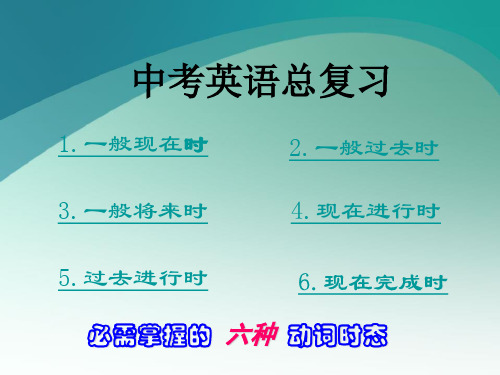
时 态
完成时:谓语用have/has +动词的过
去分词
过去 进行时:谓语用were/was +动词
的现在分词
More practice(中考链接):
• 用动词的适当形式完成句子。
• 1. Light __________ (travel) more quickly than sound does.(现在时)
练习
( A ) 1. Look at the clouds. ___.
A. It's going to rain
B. It'll be raining
C. It will be rained
D. If it rains
( D ) 2.There___ two English films next week.
A. watch B. will watch C. are watching D. watches
( C ) 3、The sun ___ in the east and___ in the west.
A. raises; set B. rise; sets C. rises; sets D. rises; set
Who is flying a kite there? 注意:go,come,leave,arrive,return,die等的进 行时可表示即将要发生的动作.
练习
( B ) 1 、______ you ___ your homework now?
A. Do; doing
B. Are; doing
C. Are; finished
D. Do; finish
( A ) 2 He ___ in our school for 20 years and he ___ here in 1977.
高中英语高考复习时态详细讲解(共16类)
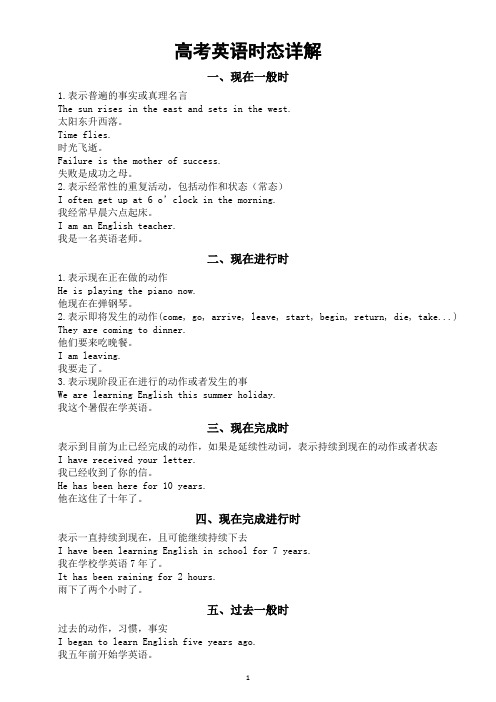
高考英语时态详解一、现在一般时1.表示普遍的事实或真理名言The sun rises in the east and sets in the west.太阳东升西落。
Time flies.时光飞逝。
Failure is the mother of success.失败是成功之母。
2.表示经常性的重复活动,包括动作和状态(常态)I often get up at 6 o’clock in the morning.我经常早晨六点起床。
I am an English teacher.我是一名英语老师。
二、现在进行时1.表示现在正在做的动作He is playing the piano now.他现在在弹钢琴。
2.表示即将发生的动作(come, go, arrive, leave, start, begin, return, die, take...) They are coming to dinner.他们要来吃晚餐。
I am leaving.我要走了。
3.表示现阶段正在进行的动作或者发生的事We are learning English this summer holiday.我这个暑假在学英语。
三、现在完成时表示到目前为止已经完成的动作,如果是延续性动词,表示持续到现在的动作或者状态I have received your letter.我已经收到了你的信。
He has been here for 10 years.他在这住了十年了。
四、现在完成进行时表示一直持续到现在,且可能继续持续下去I have been learning English in school for 7 years.我在学校学英语7年了。
It has been raining for 2 hours.雨下了两个小时了。
五、过去一般时过去的动作,习惯,事实I began to learn English five years ago.我五年前开始学英语。
高中英语时态总复习
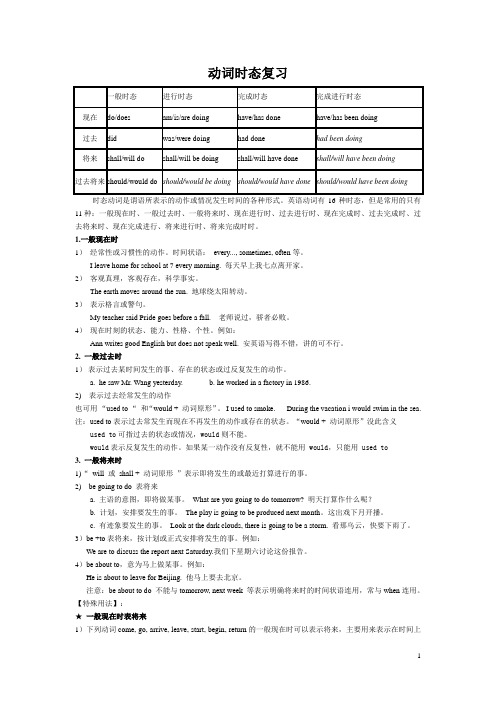
动词时态复习一般时态进行时态完成时态完成进行时态现在do/does am/is/are doing have/has done have/has been doing过去did was/were doing had done had been doing将来shall/will do shall/will be doing shall/will have done shall/will have been doing过去将来 should/would do should/would be doing should/would have done should/would have been doing时态动词是谓语所表示的动作或情况发生时间的各种形式。
英语动词有16种时态,但是常用的只有11种:一般现在时、一般过去时、一般将来时、现在进行时、过去进行时、现在完成时、过去完成时、过去将来时、现在完成进行、将来进行时、将来完成时时。
1.一般现在时1)经常性或习惯性的动作。
时间状语:every..., sometimes, often等。
I leave home for school at 7 every morning. 每天早上我七点离开家。
2)客观真理,客观存在,科学事实。
The earth moves around the sun. 地球绕太阳转动。
3)表示格言或警句。
My teacher said Pride goes before a fall.老师说过,骄者必败。
4)现在时刻的状态、能力、性格、个性。
例如:Ann writes good English but does not speak well. 安英语写得不错,讲的可不行。
2. 一般过去时1)表示过去某时间发生的事、存在的状态或过反复发生的动作。
a. he saw Mr. Wang yesterday.b. he worked in a factory in 1986.2) 表示过去经常发生的动作也可用“used to “和“would + 动词原形”。
四年级英语时态总复习

四年级英语时态总复习在小学英语的四年级学习中,学生们已经接触并学习了一些基本的英语时态。
这些时态包括现在时、过去时和未来时,以及它们的各种形式,如进行时、完成时等。
下面我们将对这些时态进行总复习。
一、现在时现在时是学生们最早接触的时态,它表示现在正在发生的事情。
在英语中,我们通常使用动词的现在时形式来表示现在时。
例如:1、I am a student.我是一个学生。
2、He plays football every Sunday.他每周日都踢足球。
二、过去时过去时表示过去发生的事情。
在英语中,我们通常使用动词的过去时形式来表示过去时。
例如:1、We went to the park yesterday.我们昨天去了公园。
2、They finished their homework.他们完成了作业。
三、未来时未来时表示将来会发生的事情。
在英语中,我们通常使用动词的将来时形式来表示未来时。
例如:1、We will visit the museum next week.我们下周会去参观博物馆。
2、They are coming to see you next week.他们下周会来看你。
四、进行时进行时表示正在进行的动作或状态。
在英语中,我们通常使用动词的现在进行时形式来表示进行时。
例如:1、He is studying now.他现在正在学习。
2、They are playing football.他们正在踢足球。
五、完成时完成时表示已经完成的动作或状态。
在英语中,我们通常使用动词的现在完成时形式来表示完成时。
例如:1、I have finished my homework.我已经完成了作业。
2、They have visited many countries.他们已经访问了许多国家。
以上就是四年级英语学习的基本时态,学生们需要能够理解并正确使用这些时态,以更好地理解和使用英语。
高中英语时态总复习英语时态是英语语法中的重要部分,也是学习英语时需要掌握的重要概念之一。
初中英语六种时态归纳复习(精编word)

初中英语六种时态归纳复习时态是英语学习中一个至关重要的内容一、一般现在时:概念:经常、反复发生的动作或行为及现在的某种状况。
时间状语:always, usually, often, sometimes, every week (day, year, month…), once a week, on Sundays, etc.基本结构:①be动词;②行为动词否定形式:①am/is/are+not;②此时态的谓语动词若为行为动词,则在其前加don't,如主语为第三人称单数,则用doesn't,同时还原行为动词。
一般疑问句:①把be动词放于句首;②用助动词do提问,如主语为第三人称单数,则用does,同时,还原行为动词。
二、一般过去时:概念:过去某个时间里发生的动作或状态;过去习惯性、经常性的动作、行为。
时间状语:ago, yesterday, the day before yesterday, last week(year, night, month…), in 1989, just now, at the age of 5, one day, long long ago, once upon a time, etc.基本结构:①be动词;②行为动词否定形式:①was/were+not;②在行为动词前加didn't,同时还原行为动词。
一般疑问句:①was或were放于句首;②用助动词do的过去式did 提问,同时还原行为动词。
三、一般将来时:概念:表示将要发生的动作或存在的状态及打算、计划或准备做某事。
时间状语:tomorrow, next da y(week, month, year…),soon, in a few minutes, by…,the day after tomorrow, etc.基本结构:①am/is/are/going to + do;②will/shall + do.否定形式:①was/were + not; ②在行为动词前加didn't,同时还原行为动词。
动词的时态的复习
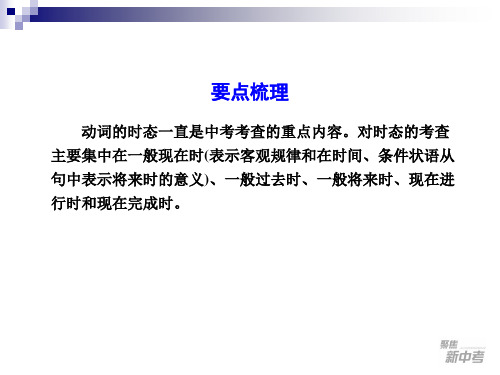
(4)come, go, move, leave, stay等动词的现在进行时可以表示 按计划将要发生的事。如:
I’m leaving tomorrow. 明天我要走了。 They are going camping for vacation. 他们度假要去野营。 Are you staying here till next week? 你会在这儿呆到下周吗?
要点梳理
动词的时态一直是中考考查的重点内容。对时态的考查 主要集中在一般现在时(表示客观规律和在时间、条件状语从 句中表示将来时的意义)、一般过去时、一般将来时、现在进 行时和现在完成时。
Ⅰ.一般现在时: 一般现在时用动词原形来表示。当主语为第三人称单数时, 动词要变为第三人称单数形式。 1.表示经常性或习惯性的动作、存在的状态或现阶段的习惯 行为。 常用的时间状语:every day, usually, always, often, sometimes, on Sunday, once a week等。 如:I go to school at 7 every morning. 每天早上我七点去上学。 2. 表示目前的情况,特点或状态。 如:I am a teacher. 我是教师。 She likes watching TV. 她喜欢看电视。
come/arrive/reach/ get/move to—be in/at come back—be back
buy—have borrow—keep go out—be out die—be dead leave—be away return—be back go to bed—be in bed become—be go to sleep—sleep
Ⅲ.现在进行时: 现在进行时表示现阶段或说话时正在进行的动作及行为,常 和now, at this time, these days等时间状语连用。句子基本结构为: be动词am/is/are+现在分词。 如:Look, they are running. 看,他们正在跑步。
四年级英语时态总复习
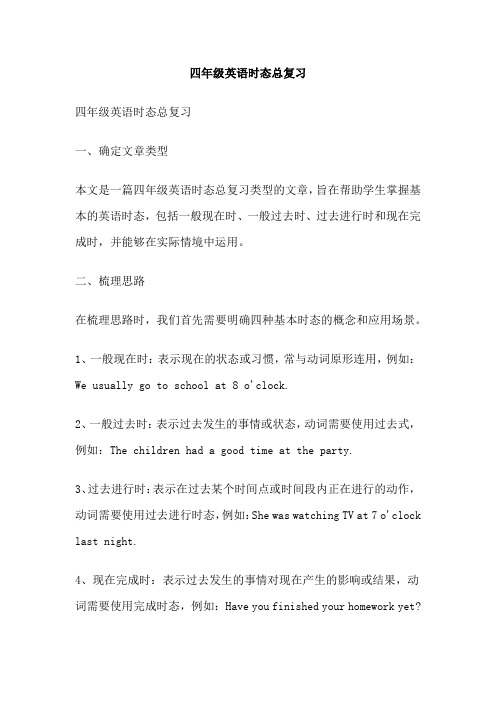
四年级英语时态总复习四年级英语时态总复习一、确定文章类型本文是一篇四年级英语时态总复习类型的文章,旨在帮助学生掌握基本的英语时态,包括一般现在时、一般过去时、过去进行时和现在完成时,并能够在实际情境中运用。
二、梳理思路在梳理思路时,我们首先需要明确四种基本时态的概念和应用场景。
1、一般现在时:表示现在的状态或习惯,常与动词原形连用,例如:We usually go to school at 8 o'clock.2、一般过去时:表示过去发生的事情或状态,动词需要使用过去式,例如:The children had a good time at the party.3、过去进行时:表示在过去某个时间点或时间段内正在进行的动作,动词需要使用过去进行时态,例如:She was watching TV at 7 o'clock last night.4、现在完成时:表示过去发生的事情对现在产生的影响或结果,动词需要使用完成时态,例如:Have you finished your homework yet?在梳理完四种基本时态的概念和应用场景后,我们可以进一步分析它们的用法和注意事项。
三、时态总复习1、一般现在时一般现在时是英语中最常用的时态之一,表示现在的状态或习惯。
在句子中,动词通常使用原形,如:We usually go to school at 8 o'clock. 这个句子中,“go”是动词原形,表示现在的习惯。
练习:用一般现在时态描述你的日常生活。
2、一般过去时一般过去时表示过去发生的事情或状态,动词需要使用过去式。
例如:The children had a good time at the party. 这个句子中,“had”是过去式,表示过去发生的事情。
练习:用一般过去时态描述你昨天做的事情。
3、过去进行时过去进行时表示在过去某个时间点或时间段内正在进行的动作,动词需要使用过去进行时态。
总结版: 英语时态复习
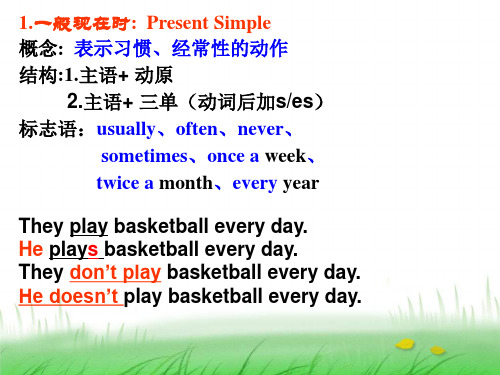
3.一般过去时: Past Simple
概念: 表示过去发生的动作
结构:主语+ 动 (-ed) +… . 标志语:yesterday、... ago、
in 1992、 last week/month… They played basketball yesterday. Did they play basketball yesterday? They didn’t play basketball yesterday. He played basketball last week.
while 表示 两个动作同时发生,
5.现在完成时: Present Perfect 概念: 表示过去发生的动作对现在造成的影响。 或者过去发生的动作一直持续到现在。 结构: 主语+ has / have+ done 标志语:already、 yet、ever、 never、since…、(for+时间段)
1.一般现在时: Present Simple 概念: 表示习惯、经常性的动作 结构:1.主语+ 动原 2.主语+ 三单(动词后加s/es) 标志语:usually、often、never、 sometimes、once a week、 twice a month、every year They play basketball every day. He plays basketball every day. They don’t play basketball every day. He doesn’t play basketball every day.
They will play basketball tomorrow. He is going to play basketball tomorrow. Shall I turn on the lights? 我开灯好吗?
小学语法讲解--四种时态总复习
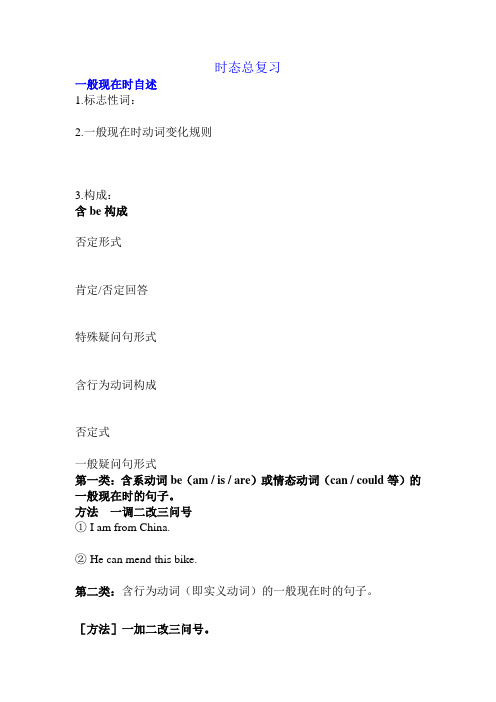
时态总复习一般现在时自述1.标志性词:2.一般现在时动词变化规则3.构成:含be构成否定形式肯定/否定回答特殊疑问句形式含行为动词构成否定式一般疑问句形式第一类:含系动词be(am / is / are)或情态动词(can / could等)的一般现在时的句子。
方法一调二改三问号①I am from China.②He can mend this bike.第二类:含行为动词(即实义动词)的一般现在时的句子。
[方法]一加二改三问号。
①Li Mei likes swimming.②We clean our classroom every day.肯定/否定回答特殊疑问句形式注:当主语是第三人称单数类型有第三人称代词he, she, it单独使用的人名、地名或称呼作主语不可数名词作主语单数可数名词作主语指示代词this, that等作主语时代词one作主语时不定代词something, anything, nothing 等作主语时II. 一般过去时构成否定句形式一般疑问句肯定回答/否定回答特殊疑问句标志性词动词变化规则(规则动词过去式的变化可速记为"直"、"去"、"双"、"改"四字诀。
)一般过去时口诀一般过去时并不难,表示过去动作、状态记心间。
动词要用过去式,时间状语句末站。
否定句很简单,didn't 站在动词原形前,其它部分不要变。
一般疑问句也好变,did放在句子前,主语、动词原形、其它部分依次站。
特殊疑问句也简单,疑问词加一般疑问句记心间。
最后一条请注意,动词过去式要牢记。
一般将来时小精灵1一般将来时构成2 否定句形式3 一般疑问句形式4 肯定回答/否定回答5 特殊疑问句形式6 标志性词现在进行时自述1 构成(注意be的变化)2 否定句形式3 一般疑问句形式4 否定回答/肯定回答5 特殊疑问句形式6 标志性词7 现在分词的变化规则巩固练习:1 I to school on time everyday.She to school on time everyday.Lucy and lily to school on time everyday.A goB goesC going2 We usually up quite earlyDo you usually up quite early?A getB getsC getting3 You five gold fish, I know.Xiao Ling five gold fish, I know.A haveB hasC having4 They climbing mountains.One of my friends climbing mountains.A likeB likesC liking5 He some interesting story book.Does he some interesting story bood?A haveB hasC having6 She exercises every day afternoon after school. She is exercises now.A takeB takesC taking7 I have a cat. It a lot every day.A sleepB sleepsC sleeping8 Tom and Jack the dishes for their mom every day. Tom and Jack the dishes for their mom tomorrow.A doB doesC doingD will do9 Jimmy his bedroom every weekLook, Jimmy is his bedroom now.A cleanB cleansC cleaning10 he often sweep the floor at home?He sweep the floor yesterday?A DoB DoesC DoingD Did11 Mike’s sister watch TV every evening?A DoB DoesC Doing12 My father never his clothes.A washB washsC washes13 My brother hard.A studyB studysC studies14 Ben often football for one hour after school.A playB playsC plaies15 The earth the sun.A goes aroundB go aroundC went around16 The sky blue.A wasB isC will17 Do you often the floor at home?Did you the floor at home yesterday?Will you the floor at home tomorrow?A sweepsB sweptC sweep18 I will play basketball .She plays basketball .Look, Chen Tao is playing basketball .Chen Tao played basketball .A everydayB tomorrowC nowD the day before yesterday 19is playing basketball at school now?is he doing at school now?is he playing basketball now?A whatB whereC who20 Is she a student?A Yes, she isn’t.B No, she is.C Yes, she is.21 Jean doesn’t football.Jean didn’t football the day before yesterday.Jean is going to football the day after tomorrow.A playB playsC played22 My day can a toy car for me.A makesB makeC made23 May here every day?May here yesterday?May here in three days?A Did cameB Does comesC Did comeD Will cameE Will comeF Does come24 What are you doing now? I a stone.What did you do yesterday? I a stone.What will you do tomorrow? I a stone.A movingB am movingC moveD movedE will move25 They went to Shanghai and good food there.A eatB eatedC ate时态时间标志口诀1. 一般现在时:“总经常有每没(美眉^^)复星周”总:always,usually等经常:often有:sometimes (记住,“有”不是have,而是“有时”)每:every week/month/year 等没:never复星周:on Mondays,on Tuesdays等2. 一般过去时:“昨天上个XX(读作叉叉)前,in加年份when字连”昨天:yesterday,后面可以加morning,afternoon,evening等上个:last,后面可以加week,month,year等XX前:ago,前面可以加three weeks/months/years agoin加年份:in 2009/2008 /1986/1220等,2010前全用一般过去时when字连:when I was a child等when字后面都是过去时,也要用一般过去时。
复习总结八大时态
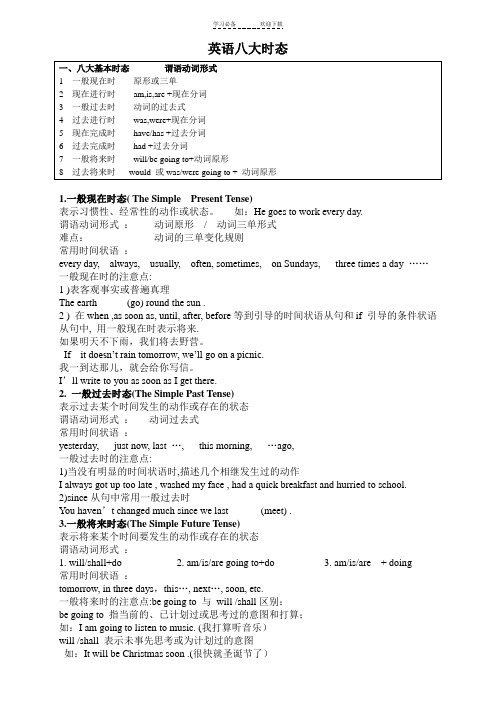
英语八大时态一、八大基本时态谓语动词形式1 一般现在时原形或三单2 现在进行时am,is,are +现在分词3 一般过去时动词的过去式4 过去进行时was,were+现在分词5 现在完成时have/has +过去分词6 过去完成时had +过去分词7 一般将来时will/be going to+动词原形8 过去将来时would 或was/were going to + 动词原形1.一般现在时态( The Simple Present Tense)表示习惯性、经常性的动作或状态。
如:He goes to work every day.谓语动词形式:动词原形/ 动词三单形式难点:动词的三单变化规则常用时间状语:every day, always, usually, often, sometimes, on Sundays, three times a day ……一般现在时的注意点:1 )表客观事实或普遍真理The earth _____ (go) round the sun .2 ) 在when ,as soon as, until, after, before等到引导的时间状语从句和if 引导的条件状语从句中, 用一般现在时表示将来.如果明天不下雨,我们将去野营。
If it doesn’t rain tomorrow, we’ll go on a picnic.我一到达那儿,就会给你写信。
I’ll write to you as soon as I get there.2. 一般过去时态(The Simple Past Tense)表示过去某个时间发生的动作或存在的状态谓语动词形式:动词过去式常用时间状语:yesterday, just now, last …, this morning, …ago,一般过去时的注意点:1)当没有明显的时间状语时,描述几个相继发生过的动作I always got up too late , washed my face , had a quick breakfast and hurried to school.2)since从句中常用一般过去时You haven’t changed much since we last ______(meet) .3.一般将来时态(The Simple Future Tense)表示将来某个时间要发生的动作或存在的状态谓语动词形式:1. will/shall+do2. am/is/are going to+do3. am/is/are + doing常用时间状语:tomorrow, in three days,this…, next…, soon, etc.一般将来时的注意点:be going to 与will /shall区别:be going to 指当前的、已计划过或思考过的意图和打算;如:I am going to listen to music. (我打算听音乐)will /shall 表示未事先思考或为计划过的意图如:It will be Christmas soon .(很快就圣诞节了)4. 现在进行时态( The Present Continuous Tense )表示现在或现阶段正在发生的动作谓语动词形式:am/is/are +现在分词常用时间状语:now,listen,look, right now ,these days ,at this moment,现在进行时的注意点:1)在表达时,切记不要忘了be 动词。
四年级语文时态总复习
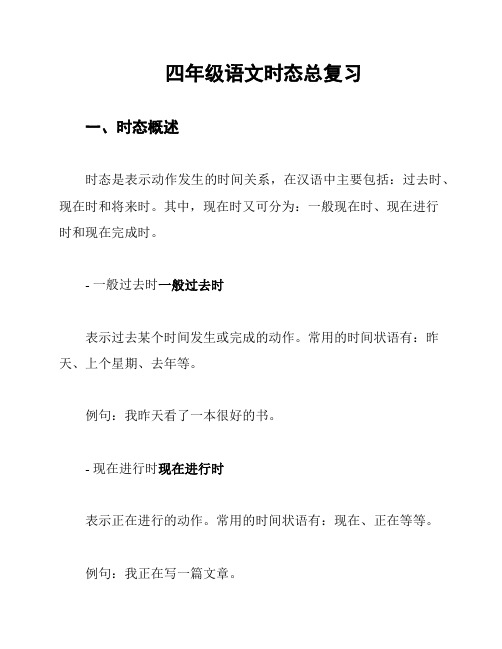
四年级语文时态总复习一、时态概述时态是表示动作发生的时间关系,在汉语中主要包括:过去时、现在时和将来时。
其中,现在时又可分为:一般现在时、现在进行时和现在完成时。
- 一般过去时一般过去时表示过去某个时间发生或完成的动作。
常用的时间状语有:昨天、上个星期、去年等。
例句:我昨天看了一本很好的书。
- 现在进行时现在进行时表示正在进行的动作。
常用的时间状语有:现在、正在等等。
例句:我正在写一篇文章。
- 一般现在时一般现在时表示经常性或惯性的动作。
常用的时间状语有:经常、通常、总是等等。
例句:我每天早上七点钟起床。
- 现在完成时现在完成时表示已经完成的动作对现在产生的影响。
常用的时间状语有:已经、刚刚等等。
例句:我已经看完了这本书。
- 将来时将来时表示将要发生的动作。
常用的时间状语有:明天、后天、下星期等等。
例句:我明天要去看电影。
二、时态转换时态转换指根据语境变化,变化动词的时态。
在考试中,我们需要注意时态变化,以确保句子的语法正确。
1. 现在完成时变简单过去时例句:我已经写了一篇文章。
→我昨天写了一篇文章。
2. 现在完成时变现在进行时例句:我已经快两个小时没有看电视了。
→我现在正在看电视。
3. 现在进行时变一般现在时例句:我昨天一直在看书。
→我每天都看书。
4. 一般现在时变一般过去时例句:我每天都去学校。
→我昨天去了学校。
5. 一般过去时变过去进行时例句:我昨天三点钟在看电视。
→我昨天三点钟正在看电视。
三、注意事项1. 使用现在时,通常要根据时间状语来选择是一般现在时、现在进行时还是现在完成时。
2. 在描述过去事件时,通常使用一般过去时、过去进行时和过去完成时,需要根据上下文来判断所使用的时态。
3. 考虑动词的时态变换,在句子语法正确的前提下选择适当的时态。
希望本篇总复习对同学们的学习有所帮助!。
高三英语16种时态总复习及例句
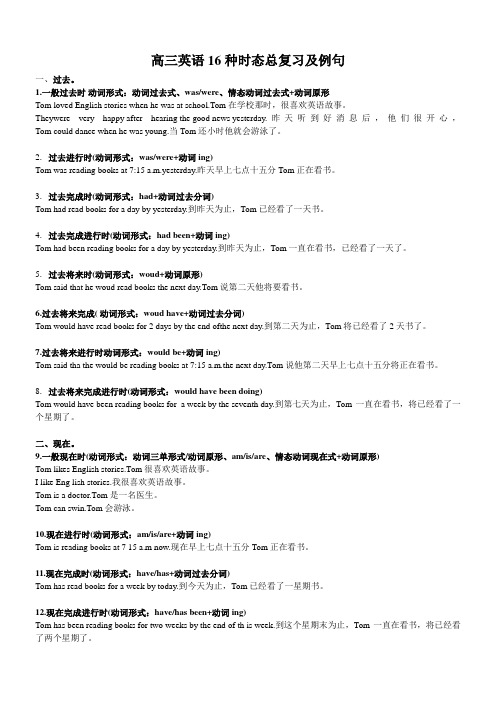
高三英语16种时态总复习及例句一、过去。
1.一般过去时动词形式:动词过去式、was/were、情态动词过去式+动词原形Tom loved English stories when he was at school.Tom在学校那时,很喜欢英语故事。
Theywere very happy after hearing the good news yesterday.昨天听到好消息后,他们很开心,Tom could dance when he was young.当Tom 还小时他就会游泳了。
2.过去进行时(动词形式:was/were+动词 ing)Tom was reading books at 7:15 a.m.yesterday.昨天早上七点十五分Tom正在看书。
3.过去完成时(动词形式:had+动词过去分词)Tom had read books for a day by yesterday.到昨天为止,Tom 已经看了一天书。
4.过去完成进行时(动词形式:had been+动词 ing)Tom had been reading books for a day by yesterday.到昨天为止,Tom 一直在看书,已经看了一天了。
5.过去将来时(动词形式:woud+动词原形)Tom said that he woud read books the next day.Tom 说第二天他将要看书。
6.过去将来完成( 动词形式:woud have+动词过去分词)Tom would have read books for 2 days by the end ofthe next day.到第二天为止,Tom 将已经看了2天书了。
7.过去将来进行时动词形式:would be+动词ing)Tom said tha the would be reading books at 7:15 a.m.the next day.Tom 说他第二天早上七点十五分将正在看书。
初中英语八种时态归纳复习
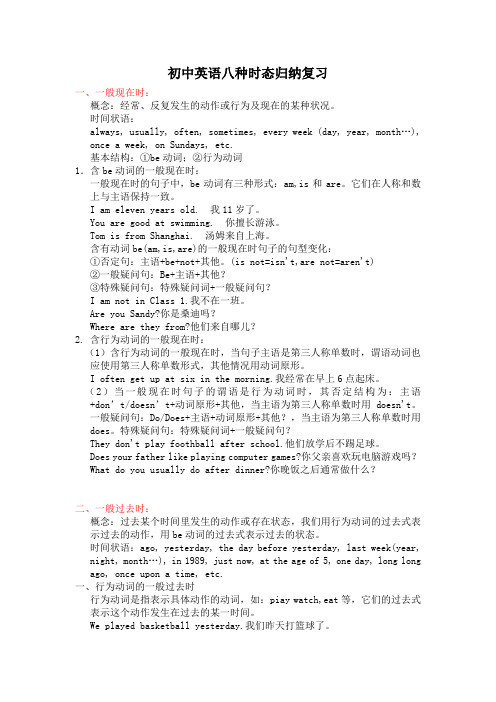
初中英语八种时态归纳复习一、一般现在时:概念:经常、反复发生的动作或行为及现在的某种状况。
时间状语:always, usually, often, sometimes, every week (day, year, month…), once a week, on Sundays, etc.基本结构:①be动词;②行为动词1.含be动词的一般现在时:一般现在时的句子中,be动词有三种形式:am,is和are。
它们在人称和数上与主语保持一致。
I am eleven years old. 我11岁了。
You are good at swimming. 你擅长游泳。
Tom is from Shanghai. 汤姆来自上海。
含有动词be(am,is,are)的一般现在时句子的句型变化:①否定句:主语+be+not+其他。
(is not=isn't,are not=aren't)②一般疑问句:Be+主语+其他?③特殊疑问句:特殊疑问词+一般疑问句?I am not in Class 1.我不在一班。
Are you Sandy?你是桑迪吗?Where are they from?他们来自哪儿?2. 含行为动词的一般现在时:(1)含行为动词的一般现在时,当句子主语是第三人称单数时,谓语动词也应使用第三人称单数形式,其他情况用动词原形。
I often get up at six in the morning.我经常在早上6点起床。
(2)当一般现在时句子的谓语是行为动词时,其否定结构为:主语+d on’t/doesn’t+动词原形+其他,当主语为第三人称单数时用doesn't。
一般疑问句:Do/Does+主语+动词原形+其他?,当主语为第三人称单数时用does。
特殊疑问句:特殊疑问词+一般疑问句?They don't play foothball after school.他们放学后不踢足球。
高中英语时态总复习
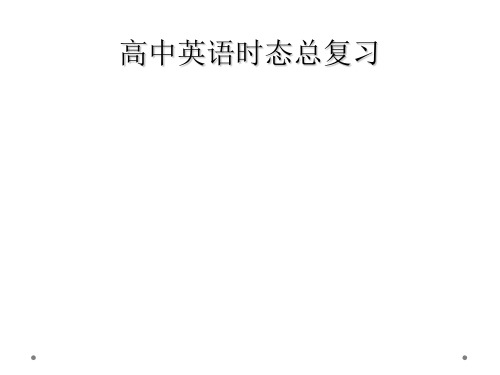
六. 一般将来时( The Simple Future Tense ) 3. 其他表示一般将来的方式 (1)am/is/are going to +V原形:表示长期打算
Tense
高考考试说明规定
要掌握的10种时态:
一般
进行
完成
完成进行
现在
一般现在 现在进行 现在完成 现在完成进行
时
时
时
时
过去 将来
一般过去 时
一般将来 时
过去进行 时
将来进行 时
过去完成 时
过 去 将 过去将来
来
时
动 一、基本时态(定义,用法) 词 的 时 二、易混时态辨析 态
综合练习
How did you spend your childhood
八.过去完成时 (The past perfect Tense)
1. 结构: had + 过去分词 2. 概念:表示过去的过去
----|--------------|---------|----> 过去之前 过去 现在 将来
no time to visit him now.
六. 一般将来时( The Simple Future Tense ) 3. 其他表示一般将来的方式 (3)am/is/are to +V原形:表示按安排或计划
将要发生的事(客观将来);表禁止,命令 等;表注定要发生的动作。 e.g. They ar_e_t_o_b__e_m__a_rr_ie_d in November.
3) 叙述过去发生的事情。 The boy _o_p_e_n_ed (open) the door,
- 1、下载文档前请自行甄别文档内容的完整性,平台不提供额外的编辑、内容补充、找答案等附加服务。
- 2、"仅部分预览"的文档,不可在线预览部分如存在完整性等问题,可反馈申请退款(可完整预览的文档不适用该条件!)。
- 3、如文档侵犯您的权益,请联系客服反馈,我们会尽快为您处理(人工客服工作时间:9:00-18:30)。
一般疑问句:Be+主语+表语?
特殊疑问句:疑问词+be+主语?
e.g. What is he? What colour is that bird? How old are you? Where are they ?
我(I)用am,
你(you)用are,
Is 连着他(he)她(she)它(it), 遇到复数都用are.
一般现在时的时间状语
• 通常为often、 usually、 always、 sometimes、seldom、never、 in the morning(afternoon evening) 、every day/week/year 等。
be 动词的一般现在时的句式:
肯定句:主语+be+表语
What
do you do every morning?
特殊疑问词+does +主语(he/she/it)+动词原形+其他?
What
does your brother do every morning?
专项练习: 单选 B in an office. Her parents ____in a hospital. 1 Jenny ____ A work; works B works; work C work; are working D is working; work
D liking ;
B English every evening. 6 Jenny____ A has study B studies C study D studied
填空
comes ( come) to visit. 1 I can take Li Ming there when he _____
总结:实义动词的一般现在时句式:
肯定句: 主语(I/We/You/They)+实义动词+其他 e.g. They have sports every day. 主语(He/She/It)+实义动词三单现形式+其他 e.g. Lucy has sports every day. 否定句: 主语(I/We/You/They)+do+ not+动词原形+其他 e.g. They don’t have sports every day. 主语(He/She/It)+does +not+动词原形+其他 e.g. Lucy doesn’t have sports every day.
Does know 2 _____your sister_____(know)English? is away ______( from 远离 )her school. 3Her home____ _____ doesn't look 4The toy____________(not look) like yours very much. do have 5 Where _____you________(have)lunch every day? wants 想要 )to go swimming? 6 Who_______( Does do 7 ______she_____(do) the housework every day? play 8 Jenny and Danny usually______(play) games in the afternoon .
D 2 One of the boys_____ a black hat. A have B there is C there are D has
C tomorrow. 3 We will go shopping if it____ A don't rain B didn't rain C doesn't rain D isn't rain
4 He said the sun B ____in the east and ____in the west. A rose; set B rises; sets C rises, set D rise; sets
B music and often ____ to music. 5 Wang Mei ____ A like; listen B likes; listens C like; are listening listen
一般疑问句:
肯定回答:
否定回答:
They play football in the playground.
否定句:
They do not (don’t) play football in the playground. Do they play football in the playground? Yes, they do. No, they don’t.
时态总复习
(一)
龙文教育 文海玲
一般现在时
1.表示现在的状态:
e.g. He’s twelve. She’s at work. 2.表经常或习惯性的动作: e.g. I get up at 6:30 every day. He reads English every morning. 3.表主语具备的性格和能力等: e.g. She likes noodles. They speak French. 4.普遍真理和自然规律: e.g. Two plus four is six. The moon goes around the earth.
3.以辅音字母+y结尾的动词, 先变y为i,再加es, 如fly---flies, study--- studies等. 4.特殊变化:have---has
实义动词的一般现在时句式变化 1)表示动作, 一般人称作主语的,变否 定句须在动词前加助动词don’t; 变一般疑问句须在句首加助动词do。
E.g. They have lunch at 12:00.
肯定回答:
否定回答:
They are in the classroom. They are not (aren’t) in the 否定句: classroom. 一般疑问句: 肯定回答: Are they in the classroom?
Yes, they are.
No, they aren’t.
They don’t have lunch at 12:00. Do they have lunch at 12:00?
I get up at 6:35 in the morning.
否定句:
I do not (don’t) get up at 6:35 in the morning. Do you get up at 6:35 in the morning? Yes, I do. No, I don’t.
e.g. He is a worker. They are in the classroom.
否定句:主语+be+ not+表语
e.g. He is not a worker. They aren’t in the classroom.
e.g. Is he a worker? Yes, he is./No, he isn’t. Are they in the classroom? Yes, they are. No, they aren’t.
一般将来时
表示将来某个时间要发生的动作或存在 的状态,常与tomorrow morning, next year, the day after tomorrow等 表示将来的时间状语连用。
与一般将来时连用的时间状语
tomorrow 明天
next week 下周
this year 今年
soon 很快
否定回答:
主语是第三人称单数时,行为动词的变化规则 如下:
1.一般动词在词尾加-s,如: helps, makes, gets, swims, knows, plays等. 2.以s, x, ch , sh , 或o结尾的动词在词尾加es,如dresses, washes, catches, goes,does等.
4). 我们将会赢得这场比赛。 We will win the match. 5). 她妈妈要去澳大利亚度假。 Her mother will go to Australia on vacation. 6). 爱丽丝将养一只宠物鹦鹉。 Alice will keep a pet parrot. 7).人们的家中将会有机器人。 People will have robots in their home. 8).世界上将会只有一个国家。 There will be one country in the world.
He is happy.
Hale Waihona Puke 否定句:一般疑问句:
He is not (isn’t) happy. Is he happy? Yes, he is. No, he isn’t.
肯定回答:
否定回答:
I am happy.
否定句:
一般疑问句:
I am not happy. Are you happy? Yes, I am. No, I am not.
一般疑问句:
肯定回答:
否定回答:
2) 单三人称做主语的,变否定句须在动 词前加助动词doesn’t;变一般疑问句须 在句首加助动词does。 E.g. Jenny speaks English very well. Jenny doesn’t speak English very well. Does Jenny speak English very well?
has 9. Jim usually ________ ( have ) lunch at home. 10. Li Guanhua _______ ( be ) twenty years old. is are 11. How many students ________ ( be ) there in your class? Does she _______ study ( study ) hard? 12. ---______ does ---Yes, she _________. don’t speak ( not speak ) 13. Lucy and lily _____________ Chinese. doesn’t do 14. My father ______________ ( not do ) morning exercises every day. washes 15. She always ___________ ( wash ) her clothes on Sundays. Does your brother ________ like 16. ______ ( like ) doesn’t playing football? No, he ____________.
